#Islam: The Misunderstood Religion
Note
Do Christians/Catholics and Jews in Muslim countries have to pay dhimmi nowadays? Or was that a medieval thing? (I know ISIS did it in the territories they occupied but obviously I'm not counting them)
First thing first Dhimmi is the name of men who had to pay the tax and it means “protected person” the tax itself was called Jizya.
No Muslim state currently apply it or wish to apply it right now.
That being said the Jizya is very often misunderstood so I will explain what it is. You have to put things in their historical context. People were very often at war and borders were not as secure as they are (mostly) nowadays. In Islam you can “draft” Muslim men if a war was to happen but you cannot “draft” non Muslim men they have to chose to join the army (some didn’t allow non muslim men in the army making them automatically dhimmi) So the Jizya was a way to participate to the protection of ALL the people (including non Muslims) for men who were physically able to take arms to defend the land but didn’t. Women, children, elderly and disabled people who were not Muslim didn’t have to pay it. Same with non Muslim abled men who wanted and were allowed to take arms instead to protect the land and its people. In the majority of cases but not all people who couldn’t afford it were also automatically forgiven. The Jizya was also a way to be allowed autonomy and freedom in their religious practices.
It’s also important to say that the amount was often based on existing taxes before the Islamic conquest in the area and that Muslims had to pay their own taxes that non Muslims didn’t have to pay. (For exemple I don’t even live in a Muslim country and I give 2.5% of my savings, value of my gold jewelry included, to someone in need or to charity every year because it’s an obligation for Muslims.).
In some cases Muslims also had to pay the Jizya. In what is today day Algeria and part of Libya for example the Imazighen were like “we’re okay with the whole religion thing we revert to Islam but Arabs (actual Arabs not Arabized Imazighen) can’t rule us we will rule ourselves”. Because of that the Arabs did not trust the Imazighen with weapons they didn’t allow them to serve in the military and made them pay the Jizya instead. Which was lived as an injustice (they also had to pay the Muslim specific taxes and making them pay the Jizya was implying that they were not Muslims) and led to revolts against actual Arabs not against Islam.
Lastly and this is not against anon at all as it seems to be a genuine question, people (again not anon) who mention the dhimmi status or the Jizya as a way to make Islam look oppressive and bad are stupid as fuck. Because it was at a time where Europeans gave you the option of conversion, exile or death. You can think the Jizya is wrong but it clearly was a HUGE improvement for a lot of the places where it was applied and it was better than what the white Christian neighbors were offering to religious minorities.
177 notes
·
View notes
Text
The Rights of Non-Muslims Under Sharia Law
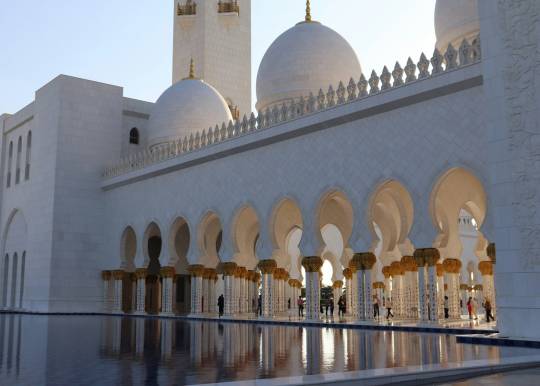
Sharia law is often misunderstood, especially regarding its treatment of non-Muslims. However, the Sharia has a rich tradition of pluralism, allowing non-Muslims such as Christians and Jews to follow their own laws while living in Muslim-majority societies.
1. Pluralism Under Sharia: A Historical Perspective
Sharia law is not a monolithic system but rather a framework that has historically embraced justice. Within Islamic societies, non-Muslims, particularly “People of the Book” (Christians and Jews), were allowed to practice their religion freely and follow their own legal systems concerning personal matters like marriage, divorce, and inheritance.
“Let there be no compulsion in religion: Truth stands out clear from Error.” (Quran 2:256)
This verse underscores that faith is a personal choice and that people should be allowed to practice their religion without coercion.
2. Dhimmi Status: Protection, Responsibilities, and Benefits
Non-Muslims living under Islamic rule were given the status of “dhimmi,” which granted them protection and certain rights in exchange for the payment of jizya, a tax levied on non-Muslim citizens. The jizya was not merely a tax but a means to ensure the safety and protection of non-Muslims in a Muslim-majority state. It also exempted them from military service, which was obligatory for able-bodied Muslim men.
A lesser-known aspect of the jizya is that it also contributed to providing pensions and other benefits to non-Muslims. This system ensured that non-Muslims were cared for in the state, particularly in old age or during times of need.
The Prophet Muhammad (peace be upon him) emphasised the sanctity of the protection given to non-Muslims:
“Whoever kills a mu’ahid (a person who is granted the pledge of protection by the Muslims) shall not smell the fragrance of Paradise…” (Sahih Bukhari 3166)
“If somebody harms a disbeliever that’s living under the protection of the Muslims, they have harmed me; if they have harmed me, they have harmed God.” — Prophet Muhammed, Peace be Upon him
Islamic law does not allow for double standards when it comes to justice. Non-Muslims have the right to seek justice if they are wronged by a Muslim. Historical examples show that even the highest leaders, like Caliph Ali and Caliph Umar ibn Abdulaziz, upheld the rights of non-Muslims, ensuring that justice was served when a non-Muslim was wronged.
For instance, during Caliph Ali’s time, a Muslim who killed a non-Muslim was brought to justice, and the non-Muslim’s family was given the choice to demand the death penalty or accept compensation. Islamic Governance made sure everyone was responsible for their actions and justice was served.
3. Legal Autonomy: Non-Muslims and Their Laws
One of the most remarkable aspects of the Sharia’s application is its respect for the legal autonomy of non-Muslim communities. Non-Muslims were allowed to maintain their religious laws and customs in matters of personal status. This legal pluralism was practiced in various Islamic states, where Christian, Jewish, and other religious communities had their courts and legal systems.
“To each among you, We have prescribed a law and a clear way…” (Quran 5:48)
4. The Role of Jizya in Social Welfare
Non-Muslims under Sharia law were required to pay a tax called jizya (often being lower than the 2.5% tax on the wealth of Muslims paid towards charity yearly). However, this tax was a system that provided benefits, including protection and exemption from military service and those who would be burdened to pay it were exempted from paying it. Furthermore, certain groups, such as Christian monks who dedicated their lives to worship, were even exempted from paying the jizya, showing the flexibility and fairness of the system.
In contrast to modern taxation, where everyone must contribute regardless of their role in society, Islamic law recognised the unique circumstances of different communities and adjusted its requirements accordingly.
The Jizya was used not only for the administration and protection of the state but also to provide pensions and social services and support for those in need, including the elderly and disabled non-Muslims. This practice ensured that non-Muslims were not only protected but also cared for, reflecting the Islamic commitment to justice.
“O you who have believed, be persistently standing firm for Allah, witnesses in justice, and do not let the hatred of a people prevent you from being just. Be just; that is nearer to righteousness.” (Quran 5:8)
The positive effects of this system can be seen during the time of Umar ibn Abd-Alaziz, poverty was wiped out, justice was deeply woven into the society and the animals were fed with the surplus food and wealth as they were seen as also a part of the responsibilities of the Caliph.
There are numerous historical examples of Islamic leaders advocating for the rights of non-Muslims. For instance, the scholar Taqi al-Din famously negotiated with the Tartar leaders to secure the release of both Muslim and non-Muslim prisoners of war, demonstrating that Islamic justice extends beyond the Muslim community.

To learn more about Islam visit: howtomuslim.org
26 notes
·
View notes
Text
Ladies, vote for yourself and those denied the right
Dhurnal (Pakistan) (AFP) – Perched on her traditional charpai bed, Naeem Kausir says she would like to vote in Pakistan's upcoming election -- if only the men in her family would let her.
Issued on: 05/02/2024 - 08:41
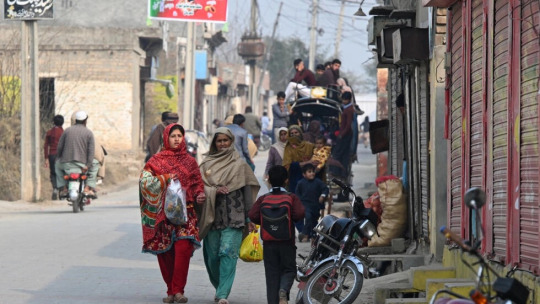
In the village of Dhurnal in Punjab, spread across crop fields and home to several thousand people, men profess myriad reasons why women should not be allowed to vote © Farooq NAEEM / AFP
Like all the women in her town, the 60-year-old former headmistress and her seven daughters -- six already university educated -- are forbidden from voting by their male elders.
"Whether by her husband, father, son or brother, a woman is forced. She lacks the autonomy to make decisions independently," said Kausir, covered in a veil in the courtyard of her home.
"These men lack the courage to grant women their rights," the widow told AFP.
Although voting is a constitutional right for all adults in Pakistan, some rural areas in the socially conservative country are still ruled by a patriarchal system of male village elders who wield significant influence in their communities.
In the village of Dhurnal in Punjab, spread across crop fields and home to several thousand people, men profess myriad reasons for the ban of more than 50 years.
"Several years ago, during a period of low literacy rates, a council chairman decreed that if men went out to vote, and women followed suit, who would manage the household and childcare responsibilities?" said Malik Muhammad, a member of the village council.
"This disruption, just for one vote, was deemed unnecessary," he concluded.
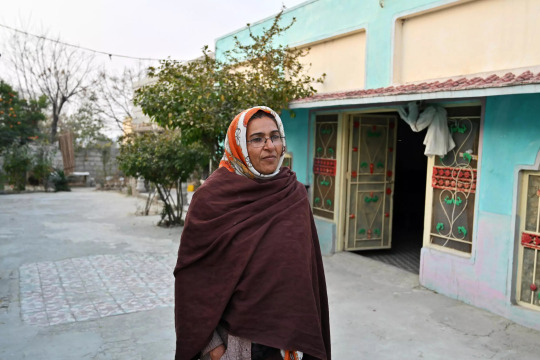
Robina Kausir, a healthcare worker, talks to AFP in Dhurnal of Punjab province, ahead of the upcoming general election © Farooq NAEEM / AFP
Muhammad Aslam, a shopkeeper, claims it is to protect women from "local hostilities" about politics, including a distant occasion that few seem to remember in the village when an argument broke out at a polling station.
Others told AFP it was simply down to "tradition".
First Muslim woman leader
The Election Commission of Pakistan (ECP) has stressed that it has the authority to declare the process null and void in any constituency where women are barred from participating.
In reality, progress has been slow outside of cities and in areas that operate under tribal norms, with millions of women still missing from the electoral rolls.
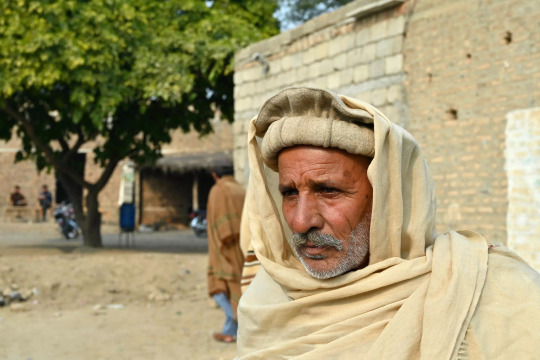
Muhammad Aslam, a shopkeeper, claims a ban on women voting is to protect them from "local hostilities" about politics © Farooq NAEEM / AFP
The elders in Dhurnal rely on neighbouring villages to fill a government-imposed quota which maintains that 10 percent of votes cast in every constituency must be by women.
Those who are allowed to vote are often pressured to pick a candidate of a male relative's choice.
In the mountainous region of Kohistan in Khyber Pakhtunkhwa province home to almost 800,000 people, religious clerics last month decreed it un-Islamic for women to take part in electoral campaigns.
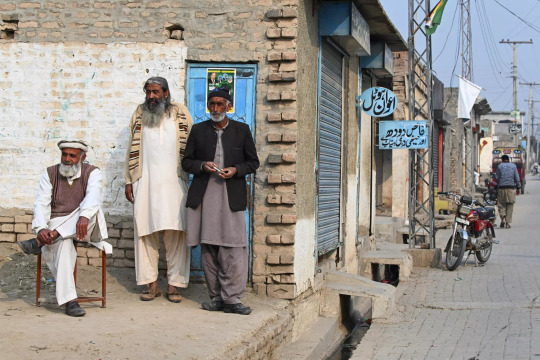
Although voting is a constitutional right for all adults in Pakistan, some rural areas in the socially conservative country are still ruled by a patriarchal system of male village elders who wield significant influence in their communities © Farooq NAEEM / AFP
Fatima Tu Zara Butt, a legal expert and a women's rights activist, said women are allowed to vote in Islam, but that religion is often exploited or misunderstood in Pakistan.
"Regardless of their level of education or financial stability, women in Pakistan can only make decisions with the 'support' of the men around them," she said.
Pakistan famously elected the world's first Muslim woman leader in 1988 -- Benazir Bhutto, who introduced policies that boosted education and access to money for women, and fought against religious extremism after military dictator Zia ul-Haq had introduced a new era of Islamisation that rolled back women's rights.
However, more than 30 years later, only 355 women are competing for national assembly seats in Thursday's election, compared to 6,094 men, the election commission has said.
Pakistan reserves 60 of the 342 National Assembly seats for women and 10 for religious minorities in the Muslim-majority country, but political parties rarely allow women to contest outside of this quota.
Those who do stand often do so only with the backing of male relatives who are already established in local politics.
"I have never seen any independent candidates contesting elections on their own," Zara Butt added.
'Everyone's right'
Forty-year-old Robina Kausir, a healthcare worker, said a growing number of women in Dhurnal want to exercise their right to vote but they fear backlash from the community if they do -- particularly the looming threat of divorce, a matter of great shame in Pakistani culture.
She credits part of the shift to access to information as a result of the rising use of smartphones and social media.
"These men instil fear in their women – many threaten their wives," she told AFP.
Robina, backed by her husband, is one of the few prepared to take the risk.
When cricketing legend Imran Khan swept to power in the 2018 election, Robina arranged for a minibus to take women to the local polling station.
Only a handful joined her, but she still marked it as a success and will do the same on Thursday's election.
"I was abused but I do not care, I will keep fighting for everyone's right to vote," Robina said.
#pakistan#Every vote counts#Men making up bs to prevent women from voting#Election Commission of Pakistan (ECP)#Men protecting women........from exercising their right to vote#Benazir Bhutto#only 355 women are competing for national assembly seats in Thursday's election compared to 6094 men
62 notes
·
View notes
Text
Is the war between US citizens?
Islam is unfortunately a misunderstood religion. Years ago you could hear that the Hijab was a torture action, women beign abused just for using it...
Now the pro-Hamas (please, let me separate this from Palestine) woman, specially around the US. Cover their entire head with a shemagh.
Let understand that most of this people born around 2005. They didn't know about past wars. They only go for the masses.
The social media is filled with interviews about the reason of the protest. "I don't know, I am just here to help"
Are these real protests for Palestine, or for a self opression?
I have many muslim friends that are sad, unavailable to help. Islam has a lot of misunderstantings.
Did you know that Allah has 99 names? And all of them have a deep meaning.
Not every muslim woman will wear a Hijab.
I see all of this protests like an "opportunity" to spit what young people can't say in a daily basis.
This is going beyond Palestine. You do not understand the magnitude of this situation.
Go and do Dhikr instead. Stop shouting "death to Israel", I am impressed that they got accepted in a university.
The cultural meaning of a shemagh must not be abducted by this.
How can you help Palestine?
First, learn geography, how is Palestine? Their weather.
Learn about arabic culture pre islamic and modern. Who is the Prophet Mohammed (PBUH) ?
Go to a near mosque, if you can enter, be silent, remove your shoes, do wudu. In that way, you are helping.
Bring a hand to your jewish classmate, teacher, friend. Religion must not be the problem, ethnicity must not be the problem.
If you want to help, first respect.
One of my favourite names of Allah is Al-Karim. I'm sure he will be happy if you learn the meaning.
-H. van Behn
19 notes
·
View notes
Note
can you explain the bin laden thing and answer the questions you posted that should be "attached" to the letter? im kind of ashamed to admit how little i know about bin laden, but i was also only born in 2001... id appreciate some context on why people are into his letter, why leftists are latching onto it, and how this connects to what's going on in gaza. i'll read as much as you wanna write. thanks so much.
in reference to my previous post
Yes, I can do that. Thank you for the ask. And I can assure you, many people who lived through 9/11 as adults don't really understand Bin Laden's motivations all that well either. If you want to read the letter yourself, you can find it here on WikiSource.
First for the questions:
1. Are bin Laden’s descriptions of political events and relations in this letter accurate? What could he have misunderstood? What could he be lying about?
When bin Laden lays out his reasons for attacking America, he says America attacked first and then claims that America is responsible for basically every bad thing that his happening to Muslims (in his view) anywhere. So America is not only responsible for its interventions in the Middle East and military aid to Israel, but also for the Russian suppression of the Chechnyan attempt at independence, Indian control of Kashmir, the Philippine government fighting Islamist rebels, and governments in the Islamic world not implementing Sharia. He implies hostility towards Islam is the reason for America's actions, for example, he thinks American soldiers in Saudi-Arabia were stationed there so that the mere presence of non-Muslims in the country with Islams most holy sites will humiliate Muslims. (When in fact they were stationed there in 1991 at the request of the Saudi government to protect it against a possible invasion from Iraq after Iraq had already invaded Kuwait.)
This is classical conspiracy-theory-thinking: Assuming that behind all the bad things that happen to your group there must be a plan by someone (often a particular group) to hurt your group and that the motivation is hatred towards you. You will find bin Laden parroting conspiracy theorist talking points in the later sections of the letter as well, for example that America created AIDS, or that Jews are secretly controlling American politicians.
The problem with conspiracy theories is very simple: they tend to be wrong. For example, if you want to explain the actions of the Russian military in Chechnya around 2000, don't look at America, look at Putin's ruling ideology. If you want to explain why Muslim governments don't implement Sharia, think about if it would help or hurt their ability to stay in power. Many problems all around the world start from local conditions, not because there is an evil mastermind behind them.
I don't think bin Laden is lying very much in this letter, except maybe to himself. He is just falling to his own pattern matching bias that wants to ascribe all bad thing that happen to Muslims to a single cause - America. (Probably because that would mean if you could just defeat America, all the problems in the Islamic world would go away.)
2. Are bin Laden’s goals outlined in the letter worthwhile? Should Americans implement his suggestions?
The latter has bin Laden's requests for Americans. Some are goals that an American may support as well, like stop military interventions in the Islamic world or ending support for countries that oppress Muslims. Though even there he sees American support where there wasn't really support, like the Russian operation in Chechnya. The US government did in fact condemn Russian actions. So this goal is not worthwhile because it is based on false assumptions about reality - the conspiracy theory about American Influence listed above.
The hugest chunk of requests however is the demand for America to convert to Islam, end the separation of religion and state, and adopt social conservative policies (ban alcohol, ban sex work, ban homosexuality, ban interest on loans, stop employing women in service industry jobs where they serve man, etc - but he also mentiones that he wants the US to sign the Kyoto protocol, so it isn't 100% identical to what US conservatives want). Arguments for or against social conservatism would make this post far too long, but I doubt many left leaning Americans would be on board for these policies. Right leaning Americans might support some of these policies, but they would certainly not want America to make Islam the state religion.
3. Were the 9/11 attacks and similar operations by al-Qaeda an effective way to achieve his goals?
Did the terrorist attack on American civilians lead to Americans wanting to convert to Islam - NO, it made Americans hate Islam.
Did it make America withdraw from Islamic countries - NO, it made America invade Afghanistan and Iraq.
I have read a bit of context on Bin Laden's goals in the past. During the Lebanese Civil War, a number of US soldiers were killed in a suicide bombing (iirc) and after that the US withdrew its soldiers. Bin Laden misjudged this and thought that an even larger attack on American civilians within the borders of the US would have the same effect on a larger scale. He was wrong and caused the opposite reaction.
Killing American troops that are deployed in/are occupying another country does make Americans sour on the war if you can keep it up over time. But attacking civilians, especially in their home country, tends to increases the will to fight in the West (with few exception - spain pulled out its troops from Iraq after a terrorist attack on trains in Madrid). In the last decade the Taliban managed to make the US retreat and took over Afghanistan again by limiting their attacks these way, constantly killing US soldiers and their allies, but leaving civilians in America alone. The Islamic State on the other hand got the whole world into uniting against it by its display of cruelties like the beheading of journalists and aid workers and by its terrorist attacks in France and other countries.
So even within his own values Bin Laden made the wrong choice when he initiated the 9/11 attacks.
Context on why the letter may have had a sudden spike in popularity recently
The more immediate reason is that the letter talks quite a bit about American support for Israeli oppression of Palestinians. And that is one of the statements in the letter that are based at least somewhat in truth - yes, Israel does oppress Palestinians and yes, the US government generally supports Israel. It is somewhat doubtful if America withdrawing support would make Israel oppress Palestinians less. (In fact, it might make Israel more aggressive because it felt more threatened, but that also isn't for certain.)
This is, I suppose, the reason why people ended up reading the letter. But the reason for them saying things like "I now realize he was right" is a specific kind of leftist gullibility/refusal to think. Leftists are opposed to oppression. They see that the United States is the most powerful country in the world and is involved, directly and indirectly, in a number of cases in which people are oppressed around the world. And then they think "If oppression is bad and the US oppresses people, people who fight against the US must be good." But the world of international politics cannot just be divided into good and evil. There are in fact things like better and worse. Bin Laden's letter overestimates the influence the US has and that its ability to change things, his vision for the world is worse than the world looks under US hegemony, and the means he chose to pursue his goals did not even help him achieve these goals - instead it just caused a number of bloody wars that got many Muslims (including himself) killed.
And I just wish leftists would think such things (statements like "Bin Laden was right") through. This isn't the first time. During the protests of 2020 after the murder of George Floyd the statement "Abolish the Police" gained tractions. Probably brought into the protest by some anarchists, other leftists thought "well, if the police oppresses people, abolishing it is the obvious solution". Without considering a) how much support by less ideologically committed people it cost them (it was an extremely unrealistic goal) and b) the risk of institutions arising in the vacuum left by the police could be worse (would private security beholden to cooperations be better than the police?, would a mafia that demanded protection money from you be better than the police?).
And right now with Gaza we see the same thing:
Does calling the 7/10 massacres "decolonization" make people likely to support decolonization? - NO
Does Hamas have a shot at conquering Israel and restoring a Palestine "from river to sea" and did the attack further this goal? - NO
If Hamas controlled all of current Israel, would the situation be better for the people who live there or would return there, even if you only consider Palestinians ? - DOUBTFUL
I think some leftists latch on to this letter because they have the same conspiracy-theory-thinking bin Laden had and saying "bin Laden was right" sounds really really radical and that makes them feel good. Their politics are very emotion driven with insufficient though put into it.
Well, I hope my long post helped to a better understanding.
#long post#asks answered#history#osama bin laden#letter to america#conspiracy theories#thinking mistakes#terrorism#islamism#imperialism#united states#leftism#politics#critical thinking#reason#emotion driven politics#'abolish the police' and other stupid slogans#israel#palestine#israel palestine conflict#israel hamas war
37 notes
·
View notes
Text

Are you scared yet???
When we hear of blood sacrifices what comes to mind?
Devil worshipping, doing something evil
And why and how did our preception of this become so?

Most of our perceptions of blood sacrifices comes from horror movies that are meant to cause over dramatic visuals.
When was the last time you saw a blood sacrifice?
People fear the unknown.
As European colonized the diaspora and Africa.
All aspects of African cultures especially the religion so to speak.
Random taunts of everything Africans did was devil worship and also Native Americans.
European's fear of the unknown, shifted the culture.

The same fault or superstition that was caste on Native Americans and Africans. Europeans are guilty of.
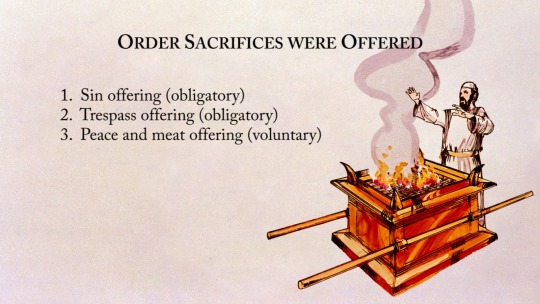

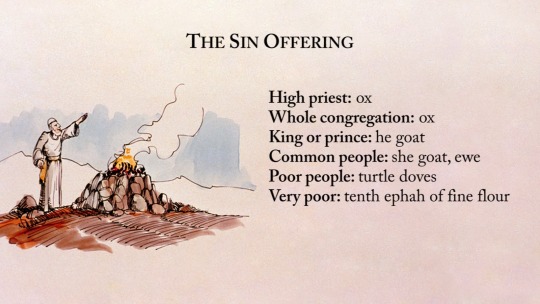
Leviticus 22:17-33 ERV
It might be because of a promise that person made, or it might just be a special sacrifice that person wanted to give to the LORD as a burnt offering.
If the gift is a bull, or a sheep, or a goat, the animal must be a male. And it must not have anything wrong with it. You must not accept any offering that has anything wrong with it. I will not accept that gift. “You might bring a fellowship offering to the LORD. That fellowship offering might be payment for a special promise that you made. Or maybe it is a special gift that you wanted to give to the Lord. It can be a bull or a sheep, but it must be healthy. There must be nothing wrong with that animal. You must not offer to the LORD any animal that is blind, that has broken bones or is crippled, or that has a discharge or a serious skin disease. You must not offer sick animals as a gift to the any animal that is blind, that has broken bones or is crippled, or that has a discharge or a serious skin disease. You must not offer sick animals as a gift to the LORD. You must not put anything like that on his altar. “Sometimes a bull or lamb will have a leg that is too long, or a foot that did not grow right. If you want to give that animal as a special gift to the Lord, it will be accepted. But it will not be accepted as payment for a special promise that you made.

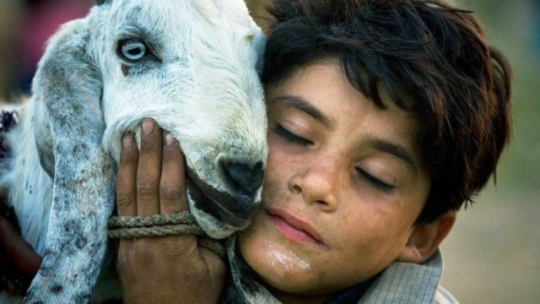
Qurbani means sacrifice. Every year during the Islamic month of Dhul Hijjah, Muslims around the world slaughter an animal – a goat, sheep, cow or camel – to reflect the Prophet Ibrahim's willingness to sacrifice his son Ismail, for the sake of God


Human sacrifice???
A foundational doctrine of the Christian faith is that the sacrifice of Jesus Christ paid the penalty for the sins of mankind—that without this act of love by the Son of God, humanity would have no hope of life after death.

In the traditional Yoruba religion and culture, sacrifice is referred to as (Ebo). It connotes offering something to a particular deity or cult in other to be in communion with them or to seek favours.

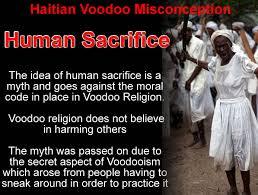

What is an EBO sacrifice?
Ebo, or sacrifice, is a broad concept including all types of sacrifices and offerings to the Orisha. These can include candles, fruit, candy, and various items or actions that may be appreciated by the Orisha. Ritual sacrifice is an important part of the beliefs and practices of Orisha worshipers.

Various scholars describe Vodou as one of the world's most maligned and misunderstood religions. Its reputation is notorious; in broader Anglophone and Francophone society, it has been widely associated with sorcery, witchcraft, and black magic. In U.S. popular culture, for instance, Haitian Vodou is usually portrayed as destructive and malevolent, attitudes often linked with anti-African racism. Non-practitioners have often depicted Vodou in literature, theater, and film; in many cases, such as the films White Zombie (1932) and London Voodoo (2004), these promote sensationalist views of the religion. The lack of any central Vodou authority has hindered efforts to combat these negative representations.
Since the 1990s, evangelical Protestantism has grown in Haiti, generating tensions with Vodouists; these Protestants regard Vodou as Satanic, and unlike the Roman Catholic authorities have generally refused to compromise with Vodouists

Leviticus 17:11 is the Old Testament’s central statement about the significance of blood in the sacrificial system. God, speaking to Moses, declares: “For the life of a creature is in the blood, and I have given it to you to make atonement for yourselves on the altar; it is the blood that makes atonement for one’s life.”
A “sacrifice” is defined as the offering up of something precious for a cause or a reason. Making atonement is satisfying someone or something for an offense committed. The Leviticus verse can be read more clearly now: God said, “I have given it to you (the creature’s life, which is in its blood) to make atonement for yourselves (covering the offense you have committed against Me).” In other words, those who are covered by the blood sacrifice are set free from the consequences of sin.

Ancient Egypt was at the forefront of domestication, and some of the earliest archeological evidence suggesting animal sacrifice comes from Egypt. However, animal sacrifice was not a central practice of Egyptian religion, but was rather a peripherical occurrence that happened away from worshippers. The oldest Egyptian burial sites containing animal remains originate from the Badari culture of Upper Egypt, which flourished between 4400 and 4000 BCE. Sheep and goats were found buried in their own graves at one site, while at another site gazelles were found at the feet of several human burials. At a cemetery uncovered at Hierakonpolis and dated to 3000 BCE, the remains of a much wider variety of animals were found, including non-domestic species such as baboons and hippopotami, which may have been sacrificed in honor of powerful former citizens or buried near their former owners. According to Herodotus, later Dynastic Egyptian animal sacrifice became restricted to livestock – sheep, cattle, swine and geese – with sets of rituals and rules to describe each type of sacrifice

Worship in ancient Greek religion typically consisted of sacrificing domestic animals at the altar with hymn and prayer. The altar was outside any temple building, and might not be associated with a temple at all. The animal, which should be perfect of its kind, is decorated with garlands and the like, and led in procession to the altar, a girl with a basket on her head containing the concealed knife leading the way. After various rituals the animal is slaughtered over the altar, as it falls all the women present "must cry out in high, shrill tones". Its blood is collected and poured over the altar. It is butchered on the spot and various internal organs, bones and other inedible parts burnt as the deity's portion of the offering, while the meat is removed to be prepared for the participants to eat; the leading figures tasting it on the spot. The temple usually kept the skin, to sell to tanners. The fact that the humans got more use from the sacrifice than the deity had not escaped the Greeks, and is often the subject of humour in Greek comedy

Practices of Hindu animal sacrifice are mostly associated with Shaktism, Shaiva Agamas and in currents of folk Hinduism called Kulamarga strongly rooted in local tribal traditions. Animal sacrifices were carried out in ancient times in India. Some later minor Puranas forbid animal sacrifice though the upapurana, Kalika Purana, describes it in detail.
Shaktism traditions
A male buffalo calf about to be sacrificed by a priest in the Durga Puja festival. The buffalo sacrifice practice, however, is rare in contemporary India.
Animal sacrifices are performed mainly at temples following the Shakti school of Hinduism where the female nature of Brahman is worshipped in the form of Kali and Durga. These traditions are followed in parts of eastern states of India at Hindu temples in Assam and West Bengal India and Nepal where goats, chickens and sometimes water buffalos are sacrificed.

Sacrifice of Animals has less to do with worshipping of Satan or being evil.
Sacrifices are not all blood some are symbolic, fruits, money, clothes, aspects of life.
Kobe Byrant had to sacrifice friends and family to become who he is.
We all make some type of symbolic sacrifice that can be time or if you are a Celebrity, you sacrifice your privacy.
Abrahamic Cultures and Europeans superstition towards non-European cultures tend to cause our consciousness of Sacrifices.

#african#afrakan#kemetic dreams#africans#brownskin#afrakans#brown skin#african culture#afrakan spirituality#hindu#hinduism#hindu mythology#hindublr#hindu calendar#lord shiva#mahadev#hindustan#hanuman#hindutva#europeans#european#blood sacrifice#blood#sacrifice#the sacred feminine#sacramento#the sacred masculine#sacred heart#kobe byrant#shava
38 notes
·
View notes
Text
okay. one day i will stop talking about islam but it's not gonna be today. anyway, to overcorrect on post-9/11 islamophobia, a lot of liberal spaces infested by the types of muslims who will call you islamophobic and disrespectful of their culture when you call them out on their homophobia or transphobia and who will deny the infestations of misogyny and antiblackness and antisemitism in their (our) communities because Um Actually You Don't Get The Full Context, have started to almost . idk the word but like, deify? whitewash? sugarcoat? islam as if it's like. One Inherently Good Singular Ideology Misunderstood By White People For Racism Reasons. when yes, obviously, islam and muslims who live in the west are oppressed, but that's not all islam is. and it's such disservice to act like Islam cannot be oppressive to so many people who do live in the global south living either directly under islamist rule or just in conservative muslim-majority communities, to say that no actually we're a peaceful religion and we WORSHIP women actually! like to gaslight people who have actually been forced to wear the hijab, who have actually been victims of misogynistic honor-based violence, who have actually been pulled out of school to be married off to a 50 year old man because "the prophet did it so it's islamically ok!"
and it's tricky to talk about because you don't want to fuel islamophobia (which, like antisemitism, is obviously a legitimate tangible thing, but also can be weaponized) also it is so fucking ANNOYINGGGGG to watch discourse on islam be led by people who have never experienced oppression fueled by islam like sure you're a good ally to guys like mohamed hijab but also people like sara hegazy mahsa amini etc etc all these people are real people who were tangibly hurt in the name of islam. there is a reason why a man like andrew tate felt it was ok for a man like him to convert to islam and there is a reason why so many Muslim men welcomed him with open fucking arms. you're sure not a good ally to queer people and atheists and christians and jews who have been tangibly hurt in the name of islam.
and we can discuss the doctrine itself, we can talk about the effects of colonialism, we can talk about how no actually islam doesn't say that lets not conflate between ~ real religion and corrupt regimes but the thing issssss. religion is literally what you make of it. it is an idea. there is a book and you take what you take from it. there is no such thing as "the correct way" to practice religion, especially when all Abrahamic religions have the capacity to be peaceful AND the capacity to be violent. what is REAL representation? who are you to say what real representation is, anyway? who decides what is extremism? why do you, personally, get to pick and choose who and what represents a certain religion?
islam, like Every Religion Ever, manifests itself in different ways depending on ur social context. whether you have the means to exact oppression via religion or whether you are disenfranchised because you're an ethnic or racial or religious minority. religion has and always will be used both as a tool for good (community building, etc) or for evil (daaesh, lol) it's not about religion itself. it's about how you use it and its place in the social pecking order.
anyway. tl;dr. i hate oversimplication and i hate overcorrection. quite frankly, it's orientalist and racist, to assume that an organized religion followed by over a billion people in most countries in the world, all believe the same beliefs. even if u think these beliefs are "good." here's over a billion of us and some of us are bound to be cunts! statistically.
#i remember learning about sara hegazi's death via people making memes about her fucking killing herself. people i know and am friends with.#by the way.#most people did not give a single flying fuck about iranian women being killed in the streets.#these people do not represent islam of course but they represent themselves and their idea of islam#just like people who feed stray cats and donate to charity in the name of islam and protect churches and synagogues#because their religion says they should. these people represent only themselves as well and their idea of Islam#this is all over the place but whatevahhh#also kossom mohamed hijab if that was not clear<3
14 notes
·
View notes
Text
"No other religion in history spread so rapidly as Islam . . . The West has widely believed that this surge of religion was made possible by the sword. But no modern scholar accepts that idea, and the Qur'an is explicit in support of the freedom of conscience."
James A. Michener (1907 - 1997) - Leading American writer; recipient of honorary doctorates in five fields from thirty leading universities and decorated with the Presidential Medal of freedom, America's highest civilian award.
Citation: [Islam - The Misunderstood Religion, Readers' Digest (American Edition) May 1955]
#islam#quran#muslim#allah#muhammad#history#mecca#medina#saudi arabia#middle east#jerusalem#palestine#muslim world#islamic world
19 notes
·
View notes
Text

As-Salam-u-Alaikum wa-rahmatullahi wa-barakatuh ("Peace be unto you and so may the mercy of Allah and his Blessings")!
The hijab is one of the most recognizable symbols in Islam. The hijab is a symbol of modesty and faith for millions of Muslim women around the world. In this blog post, we will explore the meaning and significance of the hijab while I tell you about my own personal relationship with the hijab.
What is a Hijab?
The hijab, in its most basic form, is a headscarf worn by Muslim women as a physical reminder of their faith and commitment to Islam. The primary purpose of the hijab is to maintain modesty and promote dignity for women. It serves as a visual indicator of a woman's devotion to her religion and her desire to be judged for her character and her ideas rather than her physical appearance.
What are the rules of Hijab?
It is important to note that “hijab” is just as much a verb as it is a noun. For men (yes, men have to hijab as well), that means to lower your gaze from women. Both men and women have clothing guidelines, specifically to wear loose-fitting clothing. The most known rule of the hijab, yet the most misunderstood, is that of the hijab, or headscarf.
The rules of hijab can vary among different interpretations of Islam and cultural practices. However, the general guidelines for hijab include covering the hair and neck. The purpose of these rules is to promote modesty, maintain privacy, and discourage objectification.
To Wear or Not to Wear
Contrary to popular belief, the hijab is not a symbol of oppression but rather a symbol of empowerment for many Muslim women. Islamically, no one is allowed to tell you to wear, or not wear, the hijab. By choosing to wear the hijab, women exercise their agency by deciding how they want to be seen and reclaim control over their bodies. It allows women to define their identity on their own terms, rather than conforming to societal pressures or objectification. The hijab becomes a means of self-expression, a way to showcase individuality, and a statement of faith and pride.
My First Hijab Story
I have yet to convert to Islam. That is not indicative of my relationship with Islam but of mine with my family. Despite that, I am a hijabi. I never thought I would be a hijabi. I was afraid the hijab would create a barrier between me and non-muslims. I was afraid wearing a hijab would be isolating. While some relationships have been negatively affected by my choice, the resounding effect has been the opposite.
It all started when I went to Veiled-Fest with my partner, James. I got a few hijabs for Salah, or prayer. When I walked out of the modest clothing sale, there was a beautiful courtyard with an area hidden awy by some trees. To be honest, I went to the covered area to hide while I tried on a new hijab. I was embarrassed that I didn’t know how to wear one “properly.”
After a couple of failed attempts, a group of girls who had been sitting at a table near by said I was doing great. I came clean and told them I had no clue what I was doing. “Do you want some help?” I hear a chorus reply. Please!
Before I knew it, one of the girls was showing me how to place the headscarf on my head, guiding my hands to place the magnet and fold the hijab, and how to tie it off. “Masha-Allah!” all the girls replied. Overwhelmed by the support and genuine kindness, I was fighting a lump in my throat. “Thanks! Bye!” I ran out of the courtyard so fast so I wouldn’t cry in front of them.
I wonder if they ever think about the girl they helped in the courtyard. I still think of them sometimes whenever I put on my hijab. For me, that’s what hijab symbolizes: womanhood. The way women go out of their way to support each other and have each other’s back. Women having the opportunity to protect themselves and control their own narrative. I choose how I want to be remembered: not for how I look but for what I say, how I act, and how I treat people.
Conclusion
In my personal journey, wearing the hijab has been a deeply meaningful decision. It is a reflection of my faith, my identity, and the support shared with other women. Wearing the hijab allows me to not only align my outer appearance with my inner beliefs but also serves as a reminder that I control how I want to be perceived. It has become a source of strength, empowerment, and a way to express my individuality within the framework of my faith.
7 notes
·
View notes
Quote
The Trinity stands as one of the most distinctive of all Christian teachings, setting Christianity apart from all other religions, including other monotheistic religions (such as Judaism and Islam). Because the Christian vision of God is unique, mysterious, and inscrutable to the finite mind it is often misunderstood and misrepresented.
Samples, Kenneth Richard. ‘Without a Doubt: Answering the 20 Toughest Faith Questions. p. 64
9 notes
·
View notes
Text
Fabricating ancient Egyptian culture to fit an agenda
Modern Egyptian nationalists have lately been trying to embrace pre-Arab Egyptian culture. However, most of them face an issue, which is the clash between their current Islamic belief system and the old polytheistic belief system of Egypt aka Kemetism.
This led to a lot of people here advocating the false idea that kemetism was misunderstood and it is in fact a monotheistic religion that preached for the Abrahamic God Yahweh/Allah.
Insane theories emerged such as the Egyptian Gods being metaphors for the characteristics of the “one true God”, or how the Islamic prophet Idris started this ancient Egyptian creed for Allah and the sphinx’s face represents his face.
Some may want to ask; why all this fabrication of ancient Egyptian culture? It’s mainly because of the stigma in the modern Arabic speaking world around the idea of polytheism or any other non-Abrahamic religions.
So in order for Egyptians to somehow sugarcoat Egyptian culture in the eyes of others, they end up adding some islamic or judeo-christian elements to the culture to make it seem more appealing.
Unfortunately this issue has gone too far it now accuses the king Ramses the 2nd of enslaving Jews according to the Old Testament, even though there is no archaeological evidence whatsoever for such matter.
A similar story is also in the Quran but the difference is the tyrant king was only called Pharaoh, which led to Egyptians hating on the title and even saying that the title never existed and pharaoh was just a name of a non-Egyptian Hyksos king. Any person with minimum Egyptology background would know how outrageously wrong such claim is, because the title pharaoh was used meaning “the big house” like how the white house is used instead of the US president.
Kemetism was never a part of any abrahamic faith, and it was always a polytheistic religion and proudly so. Otherwise, the christians wouldn’t have persecuted kemetic priests and worshippers during the christianization of Egypt if kemetism did serve the same deity as claimed nowadays by nationalists.
In the end, trying to fabricate an entire history so that it fits your agenda is never a respectful thing, and it just shows the world how ignorant and desperate our society has become over the centuries. So accept kemetism as it is without fabrication, or leave it alone because indigenous Egyptian culture already suffered enough.
#coptic#egypt#kemet#ⲭⲏⲙⲓ#archeology#ancient egypt#egyptian#egyptian mythology#pharaonic art#pharaoh#africa#coptic language#languages#ancient languages#art#egyptian language#north africa#coptic art#history#kemetism#kumat
42 notes
·
View notes
Text
Animal Welfare in Islam

Islam, often misunderstood in its teachings, holds a profound regard for the welfare of animals. The religion not only prohibits unnecessary harm to animals but also outlines specific guidelines ensuring their well-being. A religion where one isn’t even allowed to harm an ant without reason or overburden an animal. Let’s delve into some aspects of Islamic teachings on animal welfare, shedding light on the compassion embedded in its principles.
Animals in War: A Protected Entity
In the midst of conflict, where chaos often reigns, Islam takes a firm stance on the treatment of animals. Prophet Muhammad (peace be upon him) forbade the killing of animals except for food, emphasising the sanctity of their lives, even in the heat of battle. This reflects the compassionate nature of Islam, extending its ethical considerations to the animal kingdom.
Narrated by Ibn ‘Umar (may Allah be pleased with him): The Prophet (peace be upon him) said, “Do not kill the animals except for two reasons: (i) A useful animal (i.e., lawful to be eaten) and, (ii) An animal that causes harm (i.e., a dangerous animal).” (Sahih al-Bukhari 3131, Book 56, Hadith 40)
Horses: Not a Mere Tool of War
Islam recognises the invaluable service of horses in wars but prohibits their constant use without rest. The Prophet Muhammad (peace be upon him) advocated for kindness to animals, emphasising that they should not be overburdened or mistreated. This showcases Islam’s emphasis on the ethical treatment of animals, even in situations where they are utilised for human needs.
Narrated by Abu Huraira (may Allah be pleased with him): Allah’s Messenger (peace be upon him) said, “When you buy a camel, take hold of it’s hump and let it pass by you, for under the hump are the kidneys, and the kidneys are the seat of the soul of the animal.” (Sahih al-Bukhari 2165, Book 36, Hadith 5)
Forgiveness and Compassion: The Prostitute and the Thirsty Dog
One poignant Hadith narrates the story of a prostitute forgiven for her sins due to an act of kindness towards a thirsty dog. By giving water to the dog, she displayed compassion, and Allah, in His infinite mercy, forgave her transgressions. This illustrates Islam’s emphasis on deeds of kindness, showcasing a faith that embraces repentance and forgiveness.
“The merciful are shown mercy by the Most Merciful. Be merciful to those on the earth, and the One above the heavens will have mercy upon you.” (Sahih al-Bukhari 7376, Book 97, Hadith 41; Sahih Muslim 2319, Book 45, Hadith 144)
The Cat and the Path to Hell
The Prophet Muhammad (peace be upon him) highlighted the importance of compassion towards animals by narrating a Hadith about two women. One woman prayed regularly, while the other neglected her prayers but was kind to a cat. The latter found favor in Allah’s eyes, emphasising the significance of kindness to animals and others as an important virtue.
Islam, often portrayed in a narrow light, harbours a profound appreciation for the welfare of animals. The teachings of Prophet Muhammad (peace be upon him) showcase a religion that not only prohibits cruelty but also promotes kindness, compassion, and forgiveness. By understanding these principles, we gain a deeper appreciation for the beauty embedded in Islamic teachings, a beauty that extends beyond human relations to encompass all living beings.
To learn more about Islam visit: Howtomuslim.org
References:
Sahih al-Bukhari 2466, Book 46, Hadith 24
Sahih al-Bukhari 3140, Book 60, Hadith 27
#islamicreminders#islamdaily#islamic#allah#muslim#quran#islam#islamiyet#mosque#new article#newblog#new blog#animals#animal videos#cat
11 notes
·
View notes
Text
— TAG GAME !
list 5 topics you can talk on for an hour without preparing any material.
my fav shows like avatar: the last airbender and arcane
misperceptions of islam (mainly culture vs religion + the first and most important form of jihad and how it's very deeply misunderstood by major medias)
signs of the end times
mental disorders
wonderboy (for those who know)
tagged by: @wonryllis thank you beloved!! tagging: @mosviqu @kyuzuberri @atrirose @byhees @s-uwu-binie @neo-shitty @kyuala @goldenhypen @stealanity @wonfilms (no pressure mwah)

#tp#tag game#not to get too religious on the blr but i genuinely could talk about all of these with great detail for a very long period of time#they're very fascinating AND frustrating
5 notes
·
View notes
Note
I would much rather be called a "karen" (light misogyny) than have any male made and male reinforced religion like Christianity or Islam tell me that Im lesser as a woman, that I have to submit to men, and take away my literal rights (severe misogyny)...
Yeah depends on which version of said religion, it’s seperate sects, interpretations . It’s almost likes there’s nuance to things and you’re just going with the extreme examples. But hey it’s okay you don’t understand that things aren’t black and white and misunderstood my point
Whatever validates your fervent ideology in your own pigeon holed echo chamber lmao
6 notes
·
View notes
Text
Antisemitism plays a central role in Islamism
Islamism has been misunderstood as an extremist form of religion, whereas it is a political ideology, resulting from the Islamisation of radicalism. One factor contributing to its rise was Nazism: the Nazis brought their poisonous antisemitism with them. Islamic State took this antisemitism further, by claiming that Sh’ites were really Jews. Writing in Fathom (May 2023) Daniel Ben Ami reviews a fascinating book by Evin Ismail of Uppsala University.
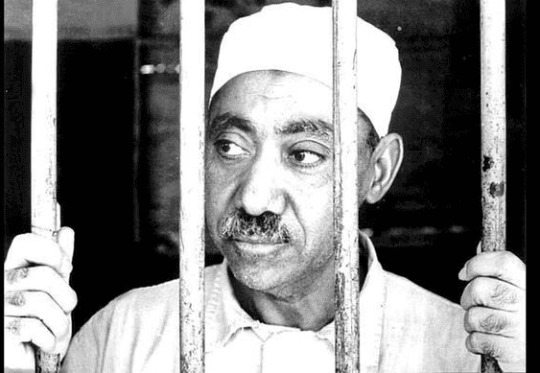
Muslim Brotherhood ideologue Sayid Qutb, one of the most influential
To be sure there is a relatively small number of formidable academics who do see Islamism as a form of political ideology rather than an extremist religion. For example, Olivier Roy, a leading French expert, argues that: ‘We must understand that terrorism does not arise from the radicalisation of Islam, but from the Islamisation of radicalism’. In other words, Islamism is an outlook that frames radical politics in Islamic language. The Islamist worldview extends well beyond Jihadi terrorists to include what are sometimes called ‘participationist’ Islamists. Such militants engage in Islamist politics but do not themselves engage in acts of violence. Other experts who see Islamism as essentially a form of political ideology, albeit one that uses an Islamic idiom, include Matthias Küntzel and Bassam Tibi. These authors are all well worth reading but sadly they have so far had relatively little influence on the public debate.
Evin Ismail, a senior lecturer in political science at the Swedish Defence University, has added to this important but insufficiently well-known literature with her Uppsala University doctorate. It examines the centrality of anti-Semitism to the outlook of the Muslim Brotherhood – which has spawned numerous organisations around the world – and Islamic State.
She draws on a variety of sources to help understand the Islamist world view and the centrality of Islamism in particular. These include a discussion of Islamic sources such as the Koran and the hadith (sayings of the Prophet Muhamad), the writings of Sayyid Qutb (the most influential Islamist ideologue), Dabiq (an Islamic State newsletter) and case studies of various Islamist terrorists.
Ismail argues that anti-Semitism has played a central part in the Islamist outlook since its inception with the foundation of the Muslim Brotherhood in Egypt in 1928. That is, it should be noted, 20 years before the founding of the state of Israel. So, seeing Islamist anti-Semitism as simply a reaction to Israel’s actions is not tenable.
Several factors contributed to the rise of Islamism and its anti-Semitism in particular. In the 1930s and early 1940s the Nazis promoted the Muslim Brotherhood as a counterweight to Britain, which then dominated Egypt, and France. Naturally the Nazis brought their poisonous anti-Semitic baggage with them. But even before the rise of the Nazis other pernicious European influences, most notably the Protocols, were having an influence on sections of Egyptian society.
The most influential Muslim Brotherhood ideologue, whose influence later spread worldwide, was Sayyid Qutb (1906-1966). Ismail draws on two of his works to help reconstruct his anti-Semitic worldview, The first was Our Struggle Against the Jews, a short pamphlet which describes Jews as a ‘cosmic Satanic evil’. The other is In the Shade of the Koran, Qutb’s multi-volume great work.
Qutb’s outlook still provides the core of Islamist ideology. In his view Muslims had suffered from the machinations of Jews and double dealing since the inception of Islam in the year 610. Jews had waged a constant war against the ummah (the Muslim community of believers) as part of their conspiratorial drive to dominate the world. The survival of Islam from this perspective depended on waging a religious war – in which killing was morally sanctioned – to defeat the cosmic evil of the Jews. Qutb argued that an elite cadre of Islamic revolutionaries was needed to achieve this goal. He also popularised the idea of takfir – the idea of excommunicating Muslims regarded as apostates.
Qutb’s worldview has been extended and adapted by numerous Islamist groups around the world. For example, Ali Khamenei, Iran’s supreme leader, has translated four of Qutb’s books into Farsi . Islamism has therefore crossed an important divide from the Muslim Brotherhood, a Sunni organisation, to the Shiite Islamic Republic of Iran.
Ismail’s focus though is Islamic State and how its doctrine developed via the Sahwa movement, an important organisation although little known in the West.
The Sahwa movement emerged in Saudi Arabia in the 1960s. It was established by exiled Muslim Brotherhood activists from Egypt and Syria. These included Mohammed Qutb, the brother of Sayyid, who was also inspired by the Protocols. Mohammed Qutb in turn inspired Osama bin Laden, the Saudi-born leader of Al-Qaeda until he was killed by American forces in 2011.
Ismail argues that Sahwa combined apolitical Wahhabism – the austere from of Islam prevalent in Saudi Arabia – with the Muslim Brotherhood’s organisational methods and political worldview. A key intellectual innovation was its addition of anti-Shiism into the mix. This was already prevalent among Syrian Muslim Brotherhood members as they were already in a conflict with the Assad regime, dominated by the Alawites, a sect within Shiite Islam. The Sunni state of Saudi Arabia was also a regional geopolitical rival of the predominantly Shiite Iran.
ISIS took this anti-Shiism a step further by linking it to their anti-Semitism. It developed the idea that Shiites were not really Muslims at all but – astonishingly – undercover Jews as they reject the true teaching of Islam. This in turn, in the view of ISIS, justified its systematic killing of Shiites in Iraq.
This is perhaps the most surprising example of the paranoid conspiratorial anti-Semitism that is central to the Islamist worldview. For example, ISIS – like most other Islamists – believes that America is controlled by Jews and Israel. It has also referred to Kurdish troops as representing ‘Peshmergen Zionism’. In addition, ISIS has claimed that Sunni leaders, especially monarchs, are ‘apostate rulers’ who act as ‘the slaves of the Jews and the Christians’.
Once the grotesque assumptions of the Islamist world view are accepted, its outlook makes sense. Jews are, from this warped perspective, engaged in an evil conspiracy against the entire global Muslim community. The conclusion Islamists draw is that it is necessary to wage a religious war against the Jews to counter this supposed threat. Killing Jews is, in this view, morally justified.
Tackling Islamism effectively means developing a better understand of it as a radical political ideology rather than as an extreme of the religion. Its doctrine needs to be carefully studied and understood. Evin Ismail’s book is an important contribution towards that urgent task.
Read article in full
Muslim Brotherhood antisemitism may have influenced ISIS in Iraq
14 notes
·
View notes
Text
HOW TO UNDERSTAND ISLAM
You shall never understand Islam as a religion unless you read the accusations raised against it by non-Muslims, and then read the responses given by Muslim scholars to those accusations. I believe you will never be a true Muslim before you do that, use your common sense and come to a solid understanding of Islamic law; thereafter, you can decide for yourself whether to adhere to Islam or continue searching for the worthiest religion of your faith. This is what my book and my blog are all about. I hope you find amidst its posts what helps you in this endeavour.
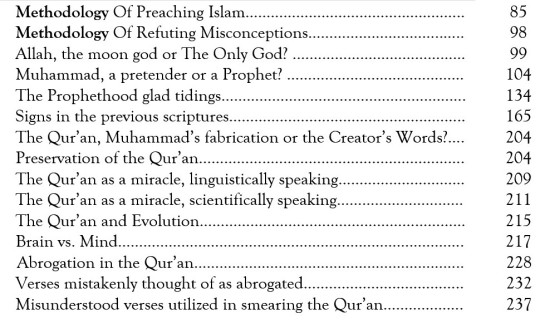
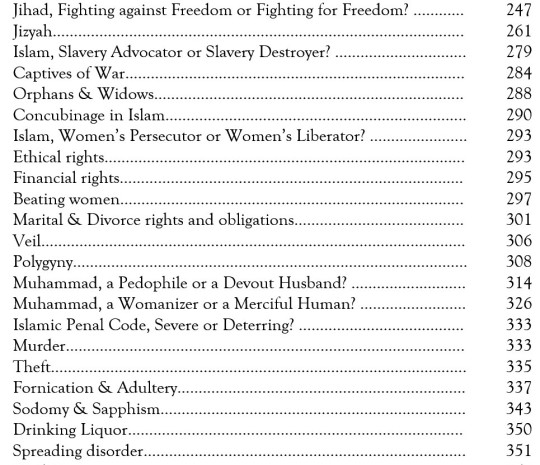

The previous posts are just samples of what you can find on my free blog and inside the book (a free pdf version is available on the blog). I hope you would be interested in reading and learning instead of following others' opinions or stereotyping those who are different.
#islam#islamic methodologies made easy#islamic teachings#religion#qur'an#muslim#prophet muhammad#faith
3 notes
·
View notes